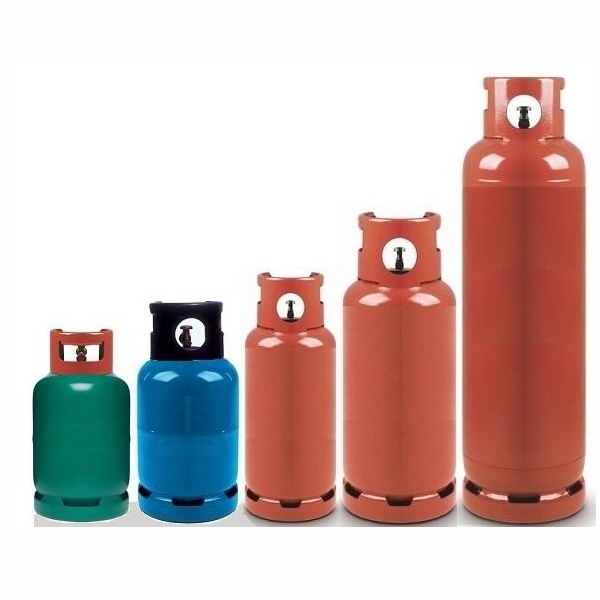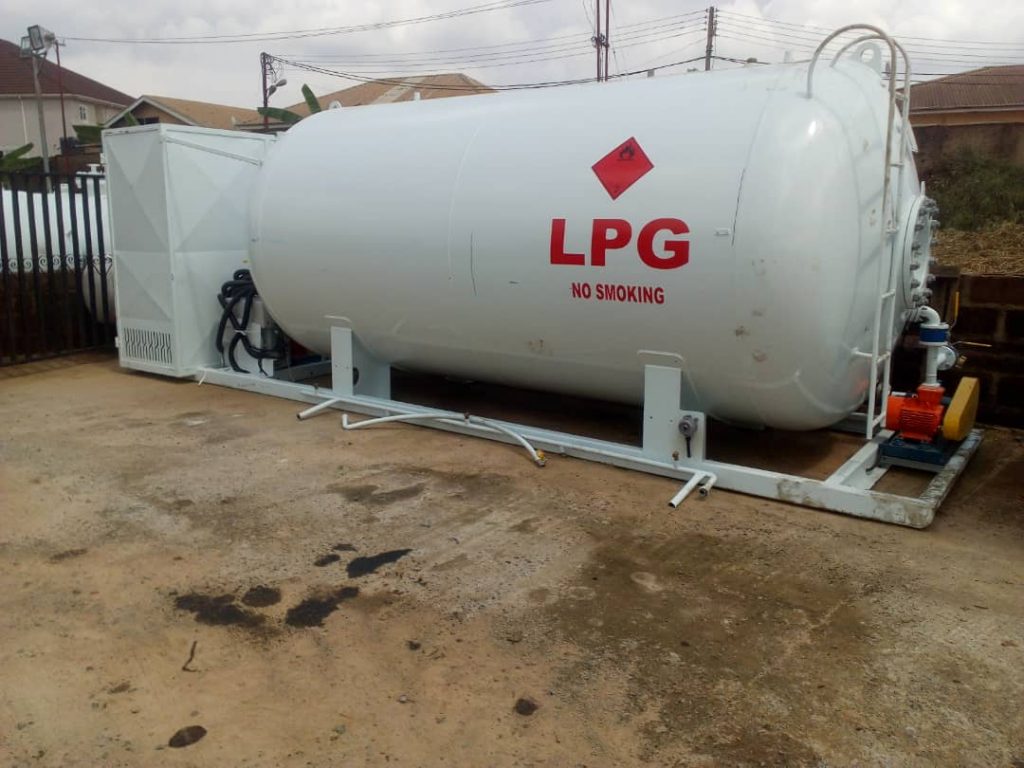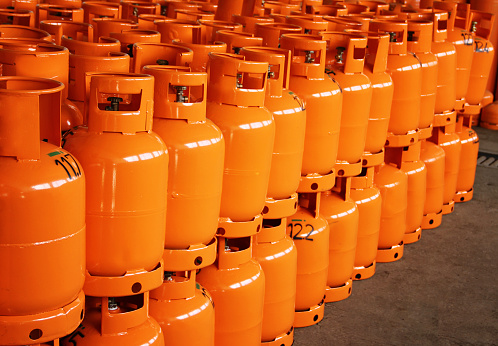Except the Federal Government takes urgent steps to address the current energy crisis, Nigerians may be forced to revert to the stone age of using firewood and charcoal as means domestic energy for cooking.
For over two weeks, acute shortages of Dual Purpose Kerosene (DPK) and Liquefied Petroleum Gas (LPG), popularly called cooking gas has hit major cities across the country.
Latest Nigerian National Petroleum Corporation (NNPC) monthly financial and operations report for last November indicated that the Corporation imported kerosene last in September of 2016 with a volume of 33,662,899.42 litres while total production from the three refineries for the over 170 million Nigerians was a paltry 42,313,316 as against 84,153,826 last October.
The poor performance of the refineries and the inconsistent import trend to augment local production could be adduced to the current kerosene scarcity being witnessed across the country.
The development has led to brisk businesses for the few that still have the commodity in stock, to the detriment Nigerians who are made to pay more for the commodities.
Daily Sun investigations across some retail outlets and gas plants in Lagos revealed that about 95 per cent of the marketers have ran out of stock and have no hope when the next consignment would arrive at their outlets and plants, while the few with the product are smiling to the bank.
Further investigations revealed that 4 litre of kerosene which sold for N1,200 two weeks ago is now being sold for N1,600, depending on the location while a 12.5kg cylinder of gas is now sold for N4,000 to N5,000 from N3,200.
However, some stakeholders who spoke to Daily Sun on the development expressed their displeasure over the failure of government to intervene and solve the problem once and for all, lamenting that the twin challenge of kerosene and cooking gas scarcity brings untold hardship on Nigerians, especially the poor.
Kerosene dries up
The challenge of kerosene scarcity has beco e a re-occurring decimal rearing its ugly head almost on a quarterly basis, without a solution in sight.
From Lagos to Ibadan, Ilorin, Enugu, Owerri, Kano, Jos and Maiduguri, the complaints of acute shortage of kerosene is one of the headaches Nigeria are battling within t he .
But the Group General Manager, Group Public Affairs, NNPC, Mr. Ndu Ughamadu, told Daily Sun that the inability of major marketers to continue with importation of kerosene could have been responsible for the shortfall.
Ughamadu said the Corporation on its part was still fulfilling its obligation of importing the product and equally supplementing it with what it produces locally.
But contrary to NNPC’s claims that it was still importing kerosene to augment local production, its latest monthly financial and operations report for last November, indicated that the corporation imported kerosene last in September when it brought in 33,662,899.42 litres while total production from the three refineries for the over 170 million Nigerians was a paltry 42,313,316 as against 84,153,826 in last October.
A survey by the News Agency of Nigeria (NAN) revealed that kerosene scarcity has crippled Calabar and its environs as the price of the commodity now ranges between N350 and N400 per litre.
The survey showed that the product was not available in any filling station in the Cross River State capital and its suburbs, adding that the product was available only in surface tanks in parts of the city, where dealers sold it at N350 per litre. The survey revealed also that the itinerant retailers sold the commodity between N380 and N400 per litre, depending on the area.
Mrs. Grace Nja, who resides in Ikot Efanga area of the city, said she bought the product at N280 at a filling station early last week, allegeding that petrol product marketers in the state sold their consignments wholly to some middlemen from neighbouring states, instead of the consumers within the state.
Cooking gas scarcity
Six months after coming out of a similar scenario, the scarcity of cooking gas is back again. In July 2016, acute shortage of cooking gas hit major cities across the country as the current scarcity has equally taken the same dimension of 2016, where the price hit the N5,000 mark.
Nigeria, according to statistics from the Nigeria Liquefied Petroleum Gas Association (NLPGA), currently consumes 385,000 metric tonnes of LPG per annum, up from the 2013 consumption of 250,000, which is even considered too low when compared with Ghana, Senegal, Cameroon and Kenya’s utilization.
The price of LPG has soared by about 30 per cent when compared to the last one month and about 50 per cent up compared to the price in the third quarter of 2016.
This development may be a setback to the Federal Government’s target of discouraging the use of dirty fuel and deepening the use of LPG.
The issues
The Petroleum Products Pricing Regulatory Agency had in January 2016 (quarter one) increased the price of household kerosene from N50 to N83. The agency stated that the N83 per litre price applied only to the NNPC outlets. But regrettably, none of the NNPC retail outlets sold kerosene at the approved price of N83 in 2016, till date.
Another major constraint with kerosene scarcity is the issue of diversion, a sharp practice often deployed by greedy marketers who blend it with diesel to get higher volume.
On the other hand, a couple of retailers buy in large quantity from the retail outlets and now resell at double the price to the end users.
But the most worrisome of all the problems is the decision by petroleum marketers to suspend further importation of kerosene due to their inability to source forex through the official window.
For cooking gas, the challenges are multiple, according to the President of the Nigerian Association of LPG Marketers (NALPGAM), Mr. Basil Ogbuanu.
Ogbuanu in a telephone interview with Daily Sun, said the idea of discharging multiple petroleum products through a single jetty creates distortion in the supply chain of LPG.
He said since last week, a vessel laden with aviation fuel has occupied the jetty waiting to discharge while other petroleum products are queued up without a time frame on when they would be allowed to discharge their products.
He regretted that the LPG vessel has been at the anchor point for weeks incurring demurrage while no one seems to care.
On the other hand, he said the idea to price gas locally at international rates has further compounded the woes of marketers, adding that the weak exchange rate of the naira has further increased the price of LPG.
‘‘Rather than use the official exchange rate, the black market rate is used for the conversion and this has led to a 20 metric tonne of gas selling for about N5.5 million as against N3.5 million in November 2016. You will also have to consider the cost of diesel to power the generators when the gas gets to the plants. A litre of diesel now sells for N250.
“All these costs eventually lead to increase in retail price of gas. Even if the vessels are allowed to discharge now, the cost of 12.5kg from a reasonable wholesale plant cannot be less than N4,000. So the situation on hand is not that of price hike but increment,’’ he lamented.
On his part, the National Chairman, Liquefied Petroleum Gas Retailers (LPGAR) branch of NUPENG, Mr. Chika Michael Umudu, decried the ongoing instability in the supply and pricing of cooking gas across the country.
The crisis, which began around July 2016 has intensified and in the process undermining the expected development of LP gas sector in the country to ensure it becomes the number one energy source for domestic and related commercial uses.
Way out of logjam
Ogbuanu, while proffering solutions to the continued supply hitches advised the Federal Government to address the issue of infrastructure, especially the revitalisation of the NOJ and POP terminals. He wondered why the two jetties have been abandoned simply because of safety issues that government can address and help the sector to move forward.
Corroborating the assertions of NALPGAM President, the Nigerian Liquefied Natural Gas (NLNG) Limited, in an email response to Daily Sun’s inquiry, said the problem associated with supply hitches in the LPG sector is that of infrastructure.
‘‘To say that there are cabals is what those who said so would have to throw more light on. But NLNG supplies to terminals that exist. If a terminal doesn’t exist, we cannot supply to it. And today in Lagos, there are two terminals that can take LPG (cooking gas) and we supply to those two terminals. There are efforts to build terminals in Port Harcourt; when those ones are built, we will supply to them.
So those who think they can bring any cabal that would build terminals or have that investment, let them do, so that we can supply to them. We have no interest in any cabal or any one.”
The company explained that it has been working since 2007 to improve LPG supply in the country when the refineries were unable to supply the product, stressing that NLNG has been the only supplier of the product since 2007.
It added that NLNG supplies more than 80 per cent of LPG in the country, advising that as a country, there is need to build more receiving terminals.
‘‘The two we have in Lagos are not enough. We have to build more terminals in Port Harcourt and Calabar. We have to invest in transportation of LPG from those terminals into the country either by rail or by trucks. We have to get all of that done. We have to make sure that we have enough distribution centres across the country,’’ NLNG said.
NLNG equally said it was working with the government, both the executive and the legislature, on how to unblock all the challenges across the entire value chain so that LPG is available not just in Lagos but in Sokoto, Kano and Kaduna so that the issues around deforestation and people chopping trees can be reduced in a bid to improve the health and environmental concerns of the people living in those areas.
And to address the issue surrounding incessant LPG scarcity, Umudu appealed to the government to go back to the drawing board and revitaliz e the 2007 Obasanjo LP Gas policy, which helped to generate some improvements in the sector, thereby making the product relatively affordable to the lower stratum of the Nigerian society.
e the 2007 Obasanjo LP Gas policy, which helped to generate some improvements in the sector, thereby making the product relatively affordable to the lower stratum of the Nigerian society.
‘‘Before now, LP Gas has been the preserve of high income earning Nigerians. Unfortunately, we are right now witnessing a reversal of the improvements made since 2007, which, if not checked, will take Nigerians back to the stone age,’’ he warned.
And to make kerosene readily available NNPC advised major marketers to explore the window made available by the Central Bank of Nigeria (CBN) to access forex.
Source: http://sunnewsonline.com/how-kerosene-cooking-gas-scarcitys-crippling-nigerian-households/




